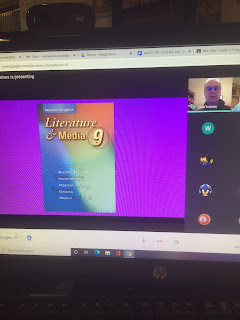My goodness, what a week! We have less than thirty days of school left. This is the time of year where we are wrapping up units (or frantically trying to start and complete new ones, as I mentioned last week). This is also the time that teachers start to collect marks and compose our final report cards. The teachers in my board received a document that is supposed to guide us on our grade compilation process. At first glance, I thought, "Oh brother, do we really need this right now?" However, when I took a second look, I found that this advice provided by the board is useful - just we need to take it with a grain of salt.
One of the main quotes that stood out for me was:
Collection of evidence about what students know and can do through multiple modalities and the triangulation of assessment data (classroom observations, oral communication, and task performance) will assist to inform the grade/mark for students with inconsistent attendance and/or work submission.
This has potential to be frustrating to teachers - how do we accurately assign grades when students are not handing in assignments? After all, educators are not trying to be cruel to their students by "punishing" them with low grades. We cannot invent grades out of thin air - but this comment suggests that we can obtain an idea of what students know via other means. (This still doesn't help if students aren't communicating with their teachers while online, but that's another kettle of fish.) My students and I have talked about grades not being something done to them, but that they can be an active part of the reporting process. In fact, my students will have direct quotes inserted into the learning skills of their report cards; we did this in Term 1 and will do it again in Term 2.

Please note: this image comes from Ken Whytock on Flickr - https://www.flickr.com/photos/kenwhytock/8646180507 - and is used under a Creative Commons Attribution-Non-Commercial 2.0 license and no changes were made.
This is another reference to triangulation in the board-wide letter:
I want to talk a little bit more about triangulation because I realized that it connects directly to a series of medical appointments that my father had recently. They used triangulation to help with their diagnosis process. I won't go into a lot of detail out of respect for my family's privacy.
As a teacher-librarian, I love triangulation. I talked about it a lot as a way to examine whether or not a source is reliable. Prashant Kulkarni, on ResearchGate.net says,
Triangulation means using more than one method to collect data on the
same topic. This is a way of assuring the validity of research through
the use of a variety of methods to collect data on the same topic, which
involves different types of samples as well as methods of data collection.
However, the purpose of triangulation is not necessarily to cross-validate
data but rather to capture different dimensions of the same phenomenon.
Triangulation also makes a lot of sense. Educators cannot limit the way they collect evidence of learning to just one method. What if the student does not function well on tests? What if they were sick the day the educator chose to do a major task related to the grade? This idea about "one size does not fit all" relates to an image that Dr. Campbell (Dr. ABC) shared in his presentation, about having a wide variety of animals (fish, birds, chimps elephants) prove their worth by a single test - climbing a tree.
Please note: this image also comes from Ken Whytock on Flickr - https://www.flickr.com/photos/kenwhytock/18572866323 - and is used under a Creative Commons Attribution-Non-Commercial 2.0 license and no changes were made
If you are one of those teachers who only uses a single or pair of tests to determine what a student's grade is in a subject, please, I beg you - Stop it! Am I saying it's easy to collect observations, conversations, and projects? No way! It takes a lot of time and effort for me. In fact, they, the students also have to make an effort to demonstrate in different ways what they know and how they know. It doesn't abdicate their responsibilities. The nice thing about collecting different kinds of evidence is that if one method has some flaws, hopefully the other methods used can overcome any biases, contradictions, inconsistencies, or gaps in the information. (For my dad's situation, this involved intake interviews with others, an interview with dad himself, and a lengthy, vigorous test that used different types of questions.) Teachers need to see the student from as many different perspectives as possible. Our goal is to help our students to learn and to describe how their learning journey has gone up to a set point.
Now to try and find the time to assess all these artifacts. (On the Victoria Day holiday, I hope to finish marking the baton solos, the first set of spooky narratives, two of the guided reading samples, and three sets of questions related to patterning. Wish me luck!)



























